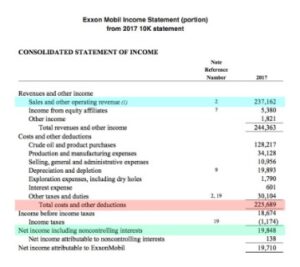Content

When you contribute to a donor-advised fund you open and fund your account with an irrevocable, tax-deductible contribution—but you don’t have to decide right away how you want to give. Your account has the potential to grow tax-free, and when you’re ready, you can recommend grants to the charities of your choice. Find out what rules apply to you and learn about some strategies that can help to reduce your tax burden. Unlike ISOs, NSOs can be awarded to both employees and independent contractors.
- A conditional debt waiver is accepted as a waiver and potential reinstatement if, at the time of the waiver, it is unlikely that the debtor becomes solvent again.
- The agency is facing severe resource constraints and has publicly said they’re prioritizing other issues at this time.
- Harness Wealth Advisers LLC (“Harness Wealth Advisers”), a wholly owned subsidiary of Multiplier, Inc., a Delaware corporation, is registered with the U.S.
- “409A” is a reference to the section of the Internal Revenue Code that sets requirements for options to be tax-free on grant.
- A team of professionals, including financial professionals, tax advisors and business and estate attorneys, can make a big difference in setting the stage for a successful process.
Whether you are a founder or you have significant equity as an early employee, it can be very complicated and expensive to plan for the tax consequences when a company is acquired. Often, your best course of action is to work with an experienced tax advisor who can provide you with assistance limiting the taxes you’ll owe and preparing to pay the tax required as a result of the acquisition. Incentive Stock Option — After exercising an ISO, you should receive from your employer a Form 3921, Exercise of an Incentive Stock Option Under Section 422. The UK has prescriptive rules which govern the circumstances in which debt-to-equity swaps will give rise to relief for the creditor and avoid a taxable credit for the debtor. For example, the release must be in consideration for ordinary share capital which rules out use of fixed rate preference shares. Section 83 allows a taxpayer to elect to be taxed on the value of their equity at the time of its grant instead of at its later vesting date.
What are the terms of the sale?
The sale price is greater than the stock fair market value on the exercise date. Because you are a California resident when the nonstatutory stock option income is recognized, the difference between the fair market value of the shares on August 1, 2013, and the option price is wage income taxable by California. If you also paid tax to Michigan on the wage income, California allows a credit for taxes paid to Michigan on this double-taxed income. Typically, the exercise price is at least the stock’s FMV on the grant date (to avoid tax complications that won’t be discussed here).
In a cash purchase situation, the equity simply converts to cash and you owe taxes on the gains you made. Stock appreciation rights provide an employee with the right to a future payment based on the increase in value of stock over a certain period. This payment in the amount of the appreciation of value is ordinary income to the employee. The employer may take the corresponding deduction for the amount of cash paid, but the deduction is subject to the section 404 timing rule. So, in this case the P group will receive the benefit of the tax deduction in the post transaction tax return filed by P.
If qualified, a person can tell the IRS they prefer this alternative in a process called an 83 election. Paying taxes early with an 83 election can potentially https://quick-bookkeeping.net/ reduce taxes significantly. If the shares go up in value, the taxes owed at vesting might be far greater than the taxes owed at the time of receipt.

With this type of option, you have the right to purchase company stock at the exercise price, but you are not required to do so. Many start-ups lack Tax Implications Of Equity the established cash-flow to pay their employees competitive wages. But equity compensation can take the place of that in certain situations.
Invest in Our Planet: Make Every Day, Earth Day
Stock options were arguably the earliest form of equity compensation and primarily include incentive stock options and nonqualified stock options . The major difference between the two is their federal tax treatment. NQSOs generally aren’t taxable compensation, and no taxable event occurs until they’re exercised. At that point, the excess of the FMV over the exercise price is compensation that’s taxable to the recipient as ordinary income and deductible by employer. The recipient may incur capital gains taxes when the shares are sold.
What is the tax advantage of equity?
Another major tax benefit with regard to equity investment is the option to set off capital gains. The short-term capital gains can be offset against short-term capital loss of another investment. You might have accrued short-term capital gains by selling your shares within a period of 6 months.
Because profits interests are frequently created as a new class of units, the issuance of profits interests will likely require an amendment to the LLC’s operating agreement. Additional considerations for amendments to the operating agreement include any voting rights, access to financial information, and special restrictions on transfer for the new class of units. The LLC will also need to establish the value of the enterprise as of the date of the grant for the purposes of establishing the profits interest is not taxable to the recipient at the time of grant. Unlike C corporations, things are not so straightforward for LLCs taxed as partnerships. In addition to the tax character of gains, other frequent issues arise relating to the admission of new partners, restrictions on employee-owners, and myriad other complications. Key issues for LLCs to keep in mind prior to granting equity-based incentives to employees are set forth below.
On July 1, 2010, your company permanently transfers you to California. On July 1, 2013, you leave the company and permanently move to Florida. From July 1, 2009 through July 1, 2013, you worked for the company a total of 700 days in California and 300 days in other states. On March 1, 2010, while a resident of Michigan, your employer grants you nonstatutory stock options.